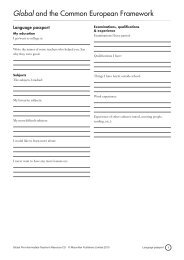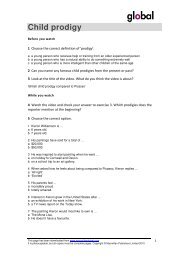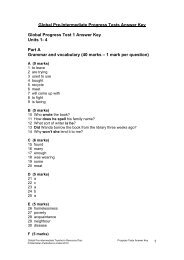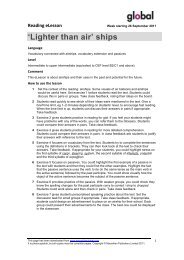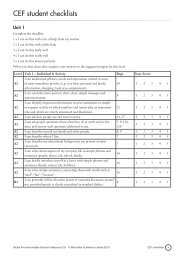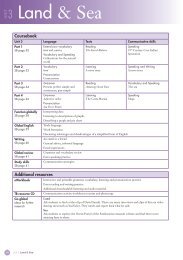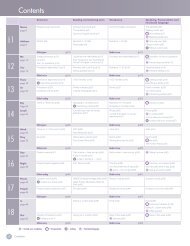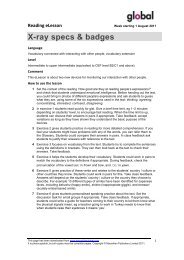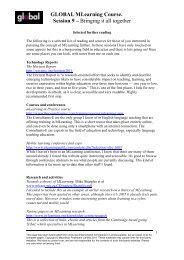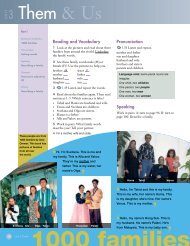Teacher's Book teaching notes - Global
Teacher's Book teaching notes - Global
Teacher's Book teaching notes - Global
Create successful ePaper yourself
Turn your PDF publications into a flip-book with our unique Google optimized e-Paper software.
UNIT4Hopes & Fears4 First of all, write these words on the board and letstudents discuss the meaning in groups of three: enemy(n), nuclear accident / disaster (n), pregnant (adj); slave(n) and factory (n). If necessary, let students refer todictionaries.Check understanding by asking concept questions, egHow long are women usually ‘pregnant’ for? What happensin a ‘nuclear disaster’? What sort of things are made in a‘factory’?Remind students that they do not need to understandevery word to complete the comprehension task.Monitor closely to see how challenging they find the task.Students compare answers in pairs.When taking class feedback, ask students to refer tospecific lines from the summaries to support theiranswers.1 HT (many women are infertile – line 4)2 1984 (line 3)3 HT (nuclear accident – line 3)4 BNW (people don’t know war – line 2)5 BNW (create babies in factories – line 5)6 1984 (even people’s thoughts – line 6)7 1984 (fall in love – a crime – line 9)8 BNW (line 3)5 Divide students into pairs and elicit their reaction tostatement 1 in exercise 4, referring them to the Usefulphrases box.Monitor and note down any linguistic points that youwould like to highlight afterwards.Take whole class feedback and pick up on any interestingviews or comments.Background note1984 was written in 1948. It has political, social and sexualthemes. The book has an anti-totalitarianism message and isin many ways a description of post-war Britain. The novel hasbeen translated into 62 different languages.Brave New World was written in 1932. Huxley gave afrightening view of the future, when other novels weredescribing ‘utopias’. Huxley was describing the fear of losingone’s individual identity in an increasingly scientific world.A Handmaid’s Tale was written in 1985. Atwood was heavilyinfluenced by Orwell. It explores the themes of women,politics and power and though frequently a school text, isconsidered by many to be anti-religious and over-explicitsexually.All of these novels have been adapted for the cinema, TV,radio and stage.TEACH globalThink localReading extraTo focus students on prepositions, write the following on theboard:a The novel is setthe future, in London. (in)b Winston worksthe government. (for)c He is getting tiredlife. (of)d They falllove. (in)e Adults are dividedfive social groups. (into)f He has to choose joining them or dying.(between)g Offred learnsan underground resistancegroup. (about)Students fill in the gaps alone, without looking at the texts.Check answers.Students close their books and test each other in pairs,making sure that the student being tested does not seethe board. The other reads the first half of each sentenceup to the preposition, eg The novel is set … . Their partnercompletes the sentence from memory, using the correctpreposition. Swap roles and repeat. Encourage students torecord the new language.Grammar (SB page 47)Using your fingers to represent each word, elicit themissing words in these two sentences, taken from theGrammar section:Thereonly 3 countries in the world.Womenhave babies. Ask students concept questions: Isthis talking about the present or future? (Future);Are they talking about plans? (No); What are these?(Predictions).Students read the two bullet points about usage underGrammar.Language noteStudents often find the different choices of future formsconfusing. Indeed, in many languages there is only one formused to convey the notion of futurity.Will has many different uses as it is a modal auxiliary verb,but is often seen by learners as ‘the future tense’, leading tounnatural sentences such as: I’m sorry I can’t come, I will goto the dentist this afternoon. Usually the choice is determinedby the context and the speaker’s perception of the event, egShe’s going to bake a cake.This is a plan.She’ll make a cake.This could be a prediction (based on knowledge of herbehaviour), a warning, a promise, etc. These functionalheadings often help learners to understand ‘will’.Pronunciation noteWill is usually contracted to ’ll, the so-called ‘dark l’ whichlearners find difficult to hear or produce, so drilling this mayhelp.50Unit 4 Hopes & Fears



